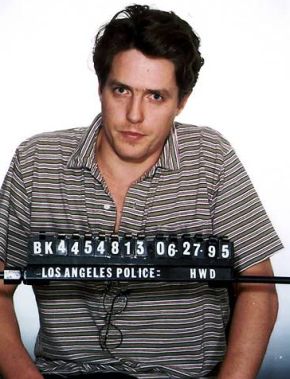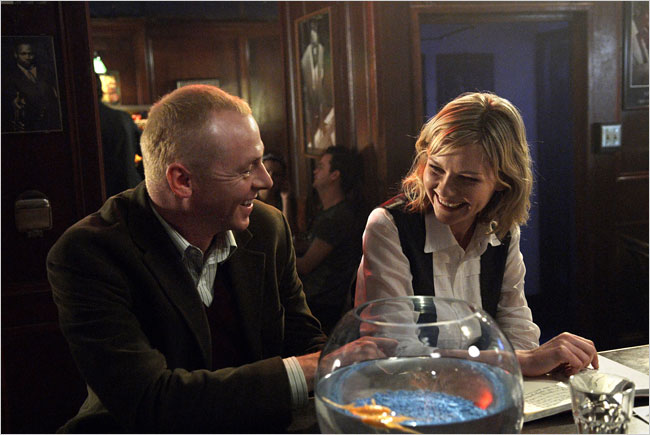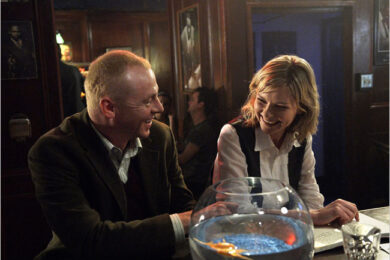There is a delicious irony in Simon Pegg playing a British maverick selling out to Americans in his new film How to Lose Friends and Alienate People, since that’s essentially what he’s in the process of doing as an actor. After the unexpected success of Hot Fuzz in the states, Pegg has gained some important friends and made bigger and bigger films. Countless British actors have moved to L.A., dropped the accent and become completely assimilated into Hollywood (Christian Bale, Idris Elba from The Wire, Welsh actor Ioan Gruffudd, Claire Forlani and Minnie Driver spring immediately to mind), but Pegg’s case is rare because, with the exception of Big Nothing, he has been allowed to retain his British accent.
In this way, Simon Pegg follows in the footsteps of Hugh Grant, Pierce Brosnan, and Jason Statham whose personas are inextricably linked to their accents, although Jason Statham is mostly tied to his cockney phrasing because his American accent in The Transporter was so appalling. Unfortunately, in each case these actors retain their Britishness at the expense of becoming stereotypes. They are forever typecast in the role that first made them comprehensible to the American Public.
They no longer even play caricatures of themselves but abstractions of a particular social class: we have Grant the eccentric, upperclass twit, Brosnan the (new money?) suave lothario, Statham the cockney gangster and now Pegg as the post-university slacker.

A typical British man
If only there was an actor who could do chav, then all the British actor jobs would be filled. At one time, Hollywood was only able to conceive of two varieties of British men: The upper class, fox hunting, snooty gentleman and the lower class, consumption-spreading, toothless street urchin. So now it seems Hollywood has made room in its cluttered consciousness for an astounding 4 sub-species of British male, which is better than most cultures: we now have only Penelope Cruz and Javier Bardem to cover all Spainish and South American characters.
It’s hard to view these actors’ popularity as anything other than a pyrrhic victory in the culture wars. In How to Lose Friends.. Pegg’s character is presented in such a way that his quirks and asshole tendencies are not necessarily seen as a personality disorder but as a symptom of being British! Hugh Grant is largely to blame for pioneering this quirky British-male phenomenon. Not many people can pass off their neuroses as pure charm.
Hugh Grant is largely to blame for pioneering this quirky British-male phenomenon. Not many people can pass off their neuroses as pure charm.

What is especially disappointing about the flatness of Pegg’s Sidney is that A) the film is a largely British made and financed film and B) Sydney Young is based on a real person!
Sydney Young is, of course, celebrity journalist Toby Young and How to Lose Friends and Alienate People is his account of working for Vanity Fair in the late 90s. After editing a small-time, but incisive pop culture magazine in London, Young was given a job offer in New York where he was forced to start over at the bottom rung and ultimately test his journalistic morals in order to succeed.
It seems odd to talk about a celebrity journalist ‘selling out’, as if complaining about celebrities has so much more integrity than licking their boots, but I suppose integrity in that field is relative. In interviews, Toby Young seems to revel in his obnoxious and tactless persona yet he remains likable through self-deprication. Luckily, Simon Pegg has built a career out of playing annoying and often embarrassing characters and making them likable (although in my estimation his characters, while funny, have not been likeable since Tim in SPACED).
It’s a difficult character to pull off and Simon Pegg does succeed in making the easily hateable Young lovable, although it takes him at least half the movie to do so. Pegg’s Young is given numerous opportunities to play philistine / everyman to all the pretentious cyphers; in one scene he proclaims that Con Air the greatest film ever made. In a story full of sycophants it’s easy to identify with the one character who comprehends the absurdity of celebrity culture, but then why would someone so skeptical of celebrity spend their life writing about it?
Likable or not, the character is still a kind of estranged British-male as seen through American eyes, which British viewers would find awkward if they weren’t so used to seeing themselves that way. So it’s all the more strange that British people are responsible for this self-caricature.
You can tell that it is a British production (co-produced by Film 4) because many of the cross-cultural gags go both ways. There will be a joke at the expense of the British about full english breakfast, which is made to look like roadkill, and then there will be a joke at the expense of the Americans about pronouncing Gloucestershire wrong. But this is not to say that this film does anything to dispel the common stereotypes of the British as bumbling, neurotic twats and Americans as career minded amoral simpletons.
There is plenty to love about this film: it boasts a quick witted script, another great Jeff Bridges character, Pegg’s impeccable comic timing and a hilarious pastiche trailer for Mother Teresa: the Movie.
But it could have been so much better. Why did Film 4 feel the need to Americanise this film and distill these intelligent memoirs into a screwball, off the wall sub-Wayans bros. comedy? We’re talking the kind of film that includes gratuitous slapstick, a Looney Toons style musical score, fast paced sitcom editing and ends on a freeze frame of someone jumping in the air. Genuinely funny anecdotes from the book are embellished within an inch of their life, all in the name of mass market appeal.
Isn’t the source material – an interesting character out of his depth in the pure human comedy of celebrity journalism – funny enough? Toby Young even admitted that he had substantial script control. This is perhaps the paradox of Toby Young. Why would someone with such an inherent disdain for American celebrity allow his book to become a quintessentially American comedy and himself a celebrity in the process? The answer obviously is: the same kind of person who’s film avatar thinks Con Air is the best film ever made.
Like so many Brits before him, that Pegg has broken America by making american films. But hopefully, like his Sydney Young character, he will ultimately be able to carve out a hybrid role within the establishment instead of being reduced to yet another British person.



